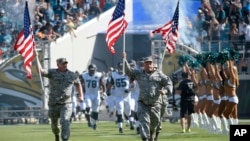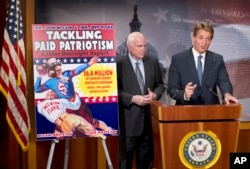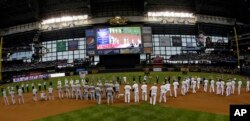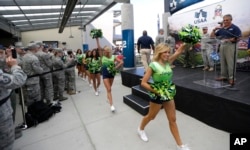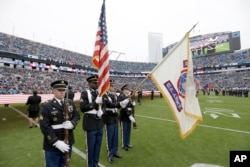It is a Sunday afternoon sometime in 2014 in the midwestern U.S. city of Milwaukee, Wisconsin, where thousands of people have come to Miller Park to see a Major League Baseball game.
In the middle of the seventh inning, with the home team Brewers preparing for their turn at bat, a singer steps in front of a microphone and belts out the song "God Bless America."
When the song ends, the crowd -- on its feet and many fans with their hats removed in a sign of respect -- cheers. And the Brewers collect another piece of a $49,000 contract with the United States military.
'Paid patriotism'
The arrangement is part of a program that Senators John McCain and Jeff Flake detailed in a report Wednesday showing what they called "paid patriotism" in American professional sports.
The report highlights what the senators found in analyzing 122 Defense Department contracts dating back to 2012, 72 of which included the so-called paid patriotism, which cost the government $6.8 million. Most of those deals involved the Army National Guard.
"Americans across the country should be deeply disappointed that many of the ceremonies honoring troops at professional sporting events are not actually being conducted out of a sense of patriotism, but for profit in the form of millions in taxpayer dollars going from the Department of Defense to wealthy pro sports franchises," McCain said.
"Fans should have confidence that their hometown heroes are being honored because of their honorable military service, not as a marketing ploy," he said.
Faults Defense Department
The report said that while the contracts do include legitimate marketing expenditures, such as signs at stadiums and booths for recruiters at games, the military cannot justify activities like paying teams to honor soldiers.
It also faults the U.S. Department of Defense for not being able to accurately account for how many of these contracts it has with sports teams and for how much.
On August 12, 2014, Maya Moore, the leading scorer for the Minnesota Lynx of the Women's National Basketball Association, wore shoes with a camouflage pattern as her team hosted the Los Angeles Sparks for Military Appreciation Night.
The event featured a service member singing the national anthem, others spreading out a large American flag on the court, and the team honoring two World War II veterans.
The military paid the Lynx $27,000 for the night (Moore's shoes are likely not included in that amount).
Those activities are typical of the military sponsorships.
Major sports contracts
The report details soldier recognitions by multiple National Football League teams, including as part of $700,000 in contracts with the New England Patriots, as well baseball's Brewers and several teams from the National Basketball Association, National Hockey League and Major League Soccer.
Soldiers singing national anthems have earned money for the NFL's Atlanta Falcons - the highest-paid team, at $879,000 - as well as the Texas Rangers and Pittsburgh Pirates baseball teams.
Perhaps the most popular activity is paying teams to set aside time for military members to have their ceremony to enlist or re-enlist on the court or field. The Miami Dolphins, Seattle Seahawks, Houston Astros, New York Mets, Detroit Red Wings and many others have accepted money for that.
The military also paid the New Orleans Saints and Indianapolis Colts to have cheerleaders appear at soldier events, according to the report.
In May, a month after McCain and Flake discovered the payments, they proposed an amendment to the Pentagon's spending bill for 2016 to restrict the practice.
McCain noted that the money spent in 2014 came as the National Guard announced it had a $101 million shortfall in funding.
'Stop this practice'
Flake told his fellow lawmakers that when some teams are taking money for those activities, it cheapens the work done by others that honor the military on their own. "So it is important we stop this practice and make sure that when fans are there and they see this outpouring of support for the military, they know it is genuine," he said.
The result was a bill that called on defense officials to review the contracts and weigh whether they are effective in meeting recruiting objectives and to report to Congress describing exactly what marketing actions are being taken.
In September, acting Under Secretary of Defense for Personnel and Readiness Brad Carson issued a memo noting "areas of concern" and saying the military's actions need to be transparent.
The memo included a set of guidelines that specified no contract with a sports team should include money paid to honor a member of the armed forces.
"We must ensure that our use of sports marketing and advertising activities provides an opportunity to increase awareness in our key markets, while at the same time promoting good stewardship of taxpayer dollars and maintaining public confidence," Carson said.
The NFL, too, issued a directive to its teams in July that highlighted the pride it takes in supporting the military, but the need to have a clear separation between that and advertising.
"It is crucial that community relations activities not be confused with recruiting and advertising activities for the military, since the resulting public perception could damage both the military and NFL brand, and undercut the effectiveness of our collective community outreach work. Therefore, the NFL and the military must carefully ensure that paid advertising is separate from community outreach or other appreciation programs that honor members of the military and their families," it said.




